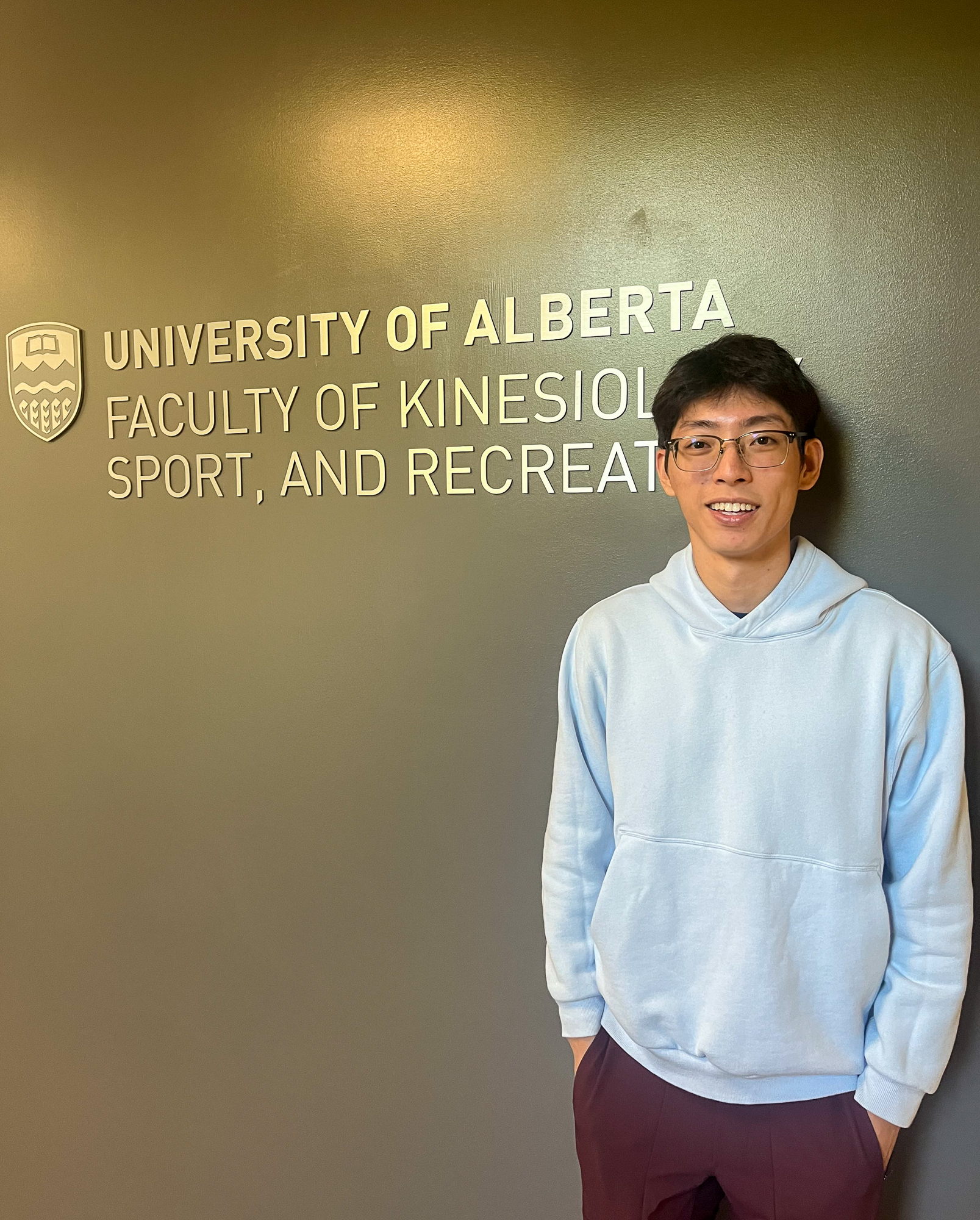Q&A with student researcher Haoxuan Liu
4 December 2024

Haoxuan Liu. Photo supplied.
Haoxuan Liu, a PhD student in physiology within the Faculty of Kinesiology, Sport, and Recreation, is breaking new ground in understanding how stress affects cardiovascular health, with a focus on developing lifestyle-based interventions such as exercise. His work bridges foundational research with real-world applications and aims to contribute to an improved overall quality of life.
Could you tell us about the program you’re enrolled in and what inspired you to choose it?
I am a PhD student in physiology. I chose this field because I am deeply interested in understanding how movement can improve people's health. My passion lies in exploring the ways physical activity can prevent chronic diseases, improve quality of life and contribute to overall well-being.
Can you describe your research in physiology and what drew you to this topic?
I am studying the impact of mental stress on vascular endothelial function and exploring whether lifestyle interventions, such as exercise training, can protect our arteries from the adverse effects of stress. My interest in this topic was sparked by reading one of my supervisor’s earlier papers, which introduced me to the fascinating connection between the mind and body. This inspired me to delve deeper into understanding how stress affects cardiovascular health and how practical, evidence-based solutions could mitigate these effects.
This research is exciting to me because many of us live with high levels of stress and we often normalize it. However, what has been overlooked is that stress can be as bad for cardiovascular health as other major risk factors such as smoking and excessive alcohol consumption. This area remains relatively understudied, and I believe there is a need to raise awareness about stress as a risk factor and to explore effective strategies to address this health issue.
How does your work in physiology contribute to a deeper understanding of human health?
First, my work aims to advance our understanding of the mechanisms underlying the cardiovascular effects of stress, focusing on how stress impairs vascular endothelial function and contributes to long-term health risks. Building on this knowledge, I will design practical lifestyle interventions targeting these mechanisms, offering evidence-based solutions for effectively preventing stress-induced cardiovascular diseases. My work will bridge foundational research with real-world applications, ultimately contributing to improved cardiovascular health.
Who is your research supervisor and how has their mentorship impacted your development?
My research supervisor is Kyra Pyke, professor and dean in the faculty. As I mentioned earlier, my interest in the interaction between stress and cardiovascular health was initially inspired by her earlier work in this area. Professor Pyke’s kind guidance and expertise have encouraged me to always think critically and approach research with curiosity and rigour. More importantly, her passion for science has been a huge inspiration to me, fuelling my own enthusiasm for discovery. Her mentorship has played a crucial role in building my confidence and honing my research skills, enabling me to grow as both a student and a researcher.
What have been some of the most rewarding moments in your academic journey?
One of the most rewarding moments y so far was receiving the first citation for my paper.
What do you hope to achieve through your research, and how do you see it impacting your field or community?
My research aims to translate fundamental physiological insights into practical solutions that can meaningfully improve human health. In the long term, I hope my work will raise awareness about the serious health impacts of stress and inspire health-care providers to incorporate lifestyle interventions into preventive care. I believe these efforts can make a significant difference, particularly for individuals struggling with stress-induced health issues, ultimately enhancing their quality of life and overall well-being.
Is there any advice you’d give to students who are just starting out in this program?
One piece of advice I would give is to engage with other students and professors as much as possible. Conversations with peers and mentors often provide valuable insights and fresh perspectives on your research, opening up new possibilities you may not have considered. Collaboration and networking are key to growth in this field.
Another important piece of advice is to prioritize your mental health. If you feel stressed, don't hesitate to reach out to your family, friends, supervisor or fellow students. Balancing life and work is crucial, and it's OK to take a break when you need it — you’re already working hard, and you deserve to rest and recharge. Remember, maintaining your well-being is as important as achieving academic success.
How has being part of the university and the Faculty of Kinesiology, Sport, and Recreation influenced you academically and personally?
I am very proud to be part of the University of Alberta and the Faculty of Kinesiology, Sport, and Recreation. During my time here, I have had the privilege of meeting incredible friends and mentors who have supported and guided me throughout my journey.
Academically, our faculty has world-leading exercise physiologists, and the wealth of expertise and resources within the faculty has been truly inspiring. The numerous opportunities for collaboration with outstanding researchers have broadened my perspective and helped me develop a more multidisciplinary approach to my work.